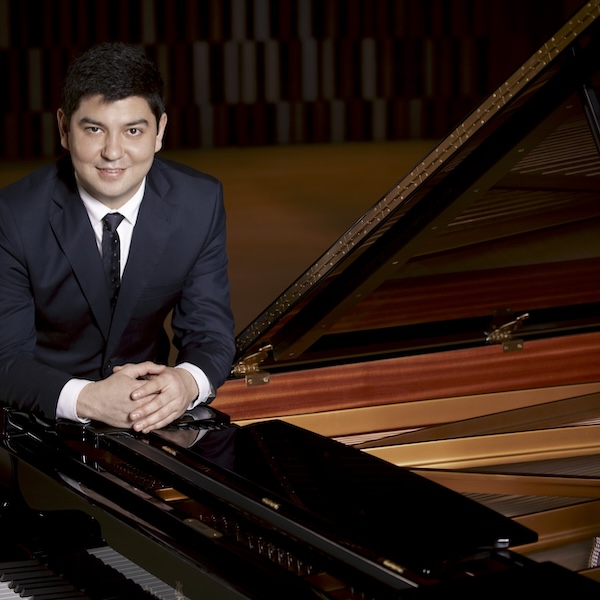Pianist Abduraimov casts a wide cultural net in Carnegie recital
It wasn’t hard to imagine that Behzod Abduraimov, pianist from Tashkent, was bringing centuries of history to his recital in Carnegie Hall Friday night. The program, after all, was an augmented version of the album he released this month, titled “Shadows of My Ancestors.”
Formerly the midpoint on the Silk Road, now a cosmopolitan post-Soviet city and the capital of the Republic of Uzbekistan, Tashkent has been repeatedly leveled by earthquakes and conquerors, yet retains echoes of the ancient cultures that mingled along that trade route.
Similarly, Friday’s program found echoes of Bach in the Belgian César Franck and of Liszt in the African-American Florence Price. The Asia-besotted Frenchman Ravel, the Russian Prokofiev, and an actual contemporary Uzbek composer, Dilorom Saidaminova, came over from the new album to round out this “roots” tour of the pianist’s world.
In a recital with this many flavors, one hopes for an outstanding colorist at the keyboard. Gifted with a technique of astonishing fluency and control and a fine sense of rubato, Abduraimov proved not so much a colorist as, so to speak, a texturist: arpeggios glinted like diamonds or swirled like fog, chords ranged from steely to evanescent, all within a modest range of tone color. The hues were few, the shades many.
This particular palette both helped and hindered Abduraimov’s performance of Franck’s Prélude, fugue et variation, Op. 18, an organ piece arranged for piano by Harold Bauer. The pianist didn’t go far in imitating the colors of the individual organ stops, but his pedaling put a church-like resonance around the piano’s rich bass and sparkling high passages. The fugue was expertly layered and transparent, and the fantasy-like variation sang and bubbled in its piano translation.
Composer Saidaminova has acknowledged that Mussorgsky’s Pictures at an Exhibition inspired her piano cycle The Walls of Ancient Bukhara, composed in 1973, revised in 1988, and receiving its New York premiere Friday. The Russian’s rugged, fantastical spirit seemed to animate these eight scenes from the old Islamic city, just down the Silk Road from Tashkent.
“Mosque Kalon” rose in a play of Islamic phrases. An atonal blaze of urgent octaves and chords evoked the violent “Samanid Kingdom,” leading to the “Tomb of Ismail Samani,” crepuscular but echoing with memories of battle. The high and low passagework of “Domes” swirled like the elaborate decorations of Islamic architecture.
“Minaret of Death” depicted a place of execution in a fiercely dissonant, percussive toccata, but there was solace in the gently twinkling clusters of “Stars Over Bukhara.” First the player’s malleable wrists, then a sudden crescendo, set the “Shadows of Ancestors” dancing. A soft, retrospective monologue “At the Walls of Ancient Bukhara” closed this evocative work.
Abduraimov’s exceptional technique, smooth and seemingly effortless, made fluidity the watchword in Ravel’s Gaspard de la nuit, not just for the watery portrait of a mermaid but for the two landlocked movements that followed. The fast figurations of “Ondine” shimmered and rippled, and even the girl’s plaintive phrases seemed drawn in water drops.
The persistent, tolling B flat of “Le Gibet” (The Gallows) can be the piece’s most conspicuous feature, but Abduraimov wove it among the finely voiced chords that etched a gloomy landscape. Snatches of somber melody near and far made the scene three-dimensional.
The formidable technical challenges of “Scarbo” fell to Abduraimov’s waving hands in an almost nonchalant display of mastery. The little goblin’s antics may have sounded more like whitewater rapids than a grotesque dance on land, but the pianist’s remarkable control of touch put plenty of rocks and eddies in the stream. Sonorities ranged from massive explosions of octaves to ultra-fast pianissimo swirls.
Abduraimov followed intermission with another display of dexterity in Price’s Fantasie nègre No. 1, in which the spiritual song “Sinner, Don’t Let This Harvest Pass” evolved from a tender plea to a granitic statement. As the melody repeated over and over—sometimes in a middle voice for a “three hands” effect, sometimes in mighty chords—the leaps grew wider and the elaborations grew gnarlier until the instrument was fairly roaring. The pianist rode the waves of sound like a swoony surfer, swelling and ebbing the tone at will, at the cost of some detail in Price’s intricate setting.
Prokofiev’s Ten Pieces from Romeo and Juliet is an orchestra-to-piano transcription, not a composed-for-piano piece like Stravinsky’s Three Scenes from Petrushka, and so Abduraimov aimed for orchestral sonorities in this performance. If the opening “Folk Dance” sounded more pearly than folksy, that was remedied in “Scene: The Street Awakens,” with its droll hopping tune. The pianist leaned fortissimo into the grand tutti of “Minuet: Arrival of the Guests” and later the stern march “Montagues and Capulets,” dripping with hatred.
The character portraits “Young Juliet,” “Friar Laurence” and “Mercutio” sounded appropriately flighty and tender, taciturn, and witty and impulsive, respectively. Happily, the composer’s selection of pieces ended on a lyrical note, gentle and decorous in the slow “Dance of the Girls with Lilies,” then pouring on the amorous rubato and soaring ecstasy in “Romeo and Juliet Before Parting,” and finally closing the piece and the scheduled program with a tender farewell.
The tender mood continued in Abduraimov’s first encore, Rachmaninoff’s Prelude in G major, Op. 32, no. 5, so liquid it almost drained away completely. A whimsical “Neapolitan Song,” Op. 39, no.18 from Tchaikovsky’s Album for the Young, and a fast, raging Rachmaninoff Prelude in G minor, Op. 23, no. 5, topped off the evening.
Carnegie Hall presents pianist Yunchan Lim performing the complete etudes of Chopin, 8 p.m. Feb. 21. carnegiehall.org

Posted Jan 27, 2024 at 11:09 pm by Louise T Gantress
It was excellent! Especially the Prokofiev Romeo & Juliete and the last encore, Rachmaninoff Prelude in G minor, Op 23 No 5. So glad to be in attendance. Second time I have heard him. Everything was so well done, difficult to pick a favorite.